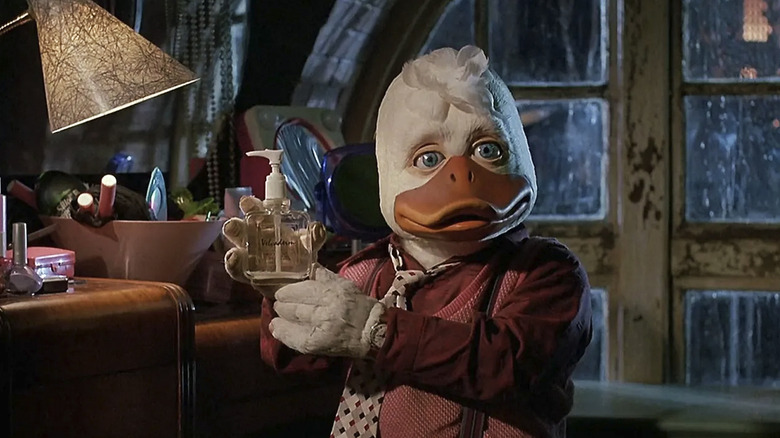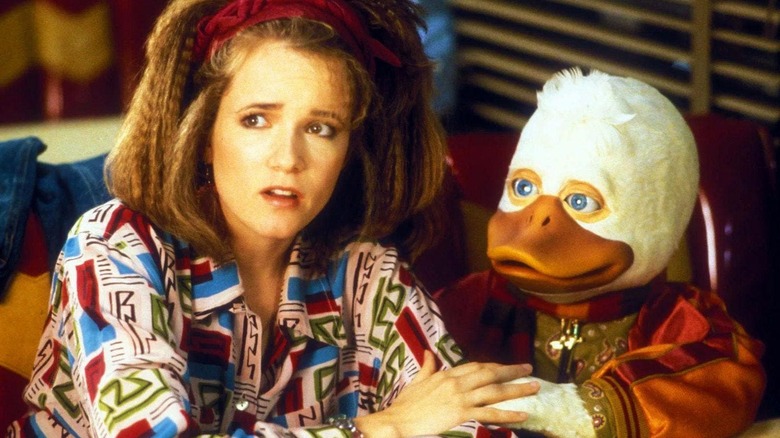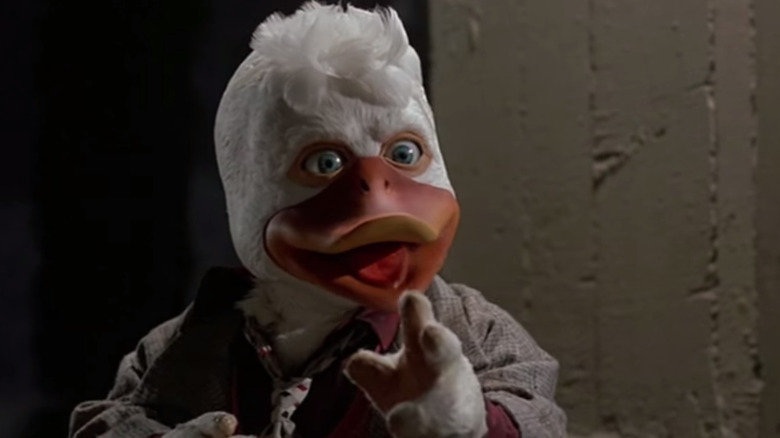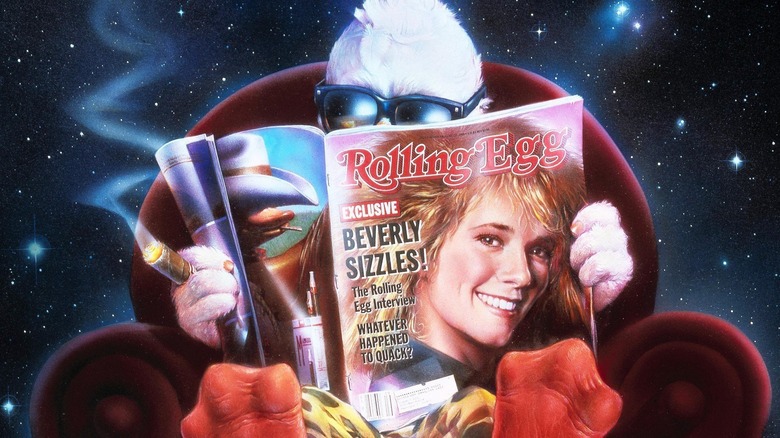Robin Williams Was The Original Howard The Duck – Here's Why He Left The Project
Willard Huyck's 1986 film "Howard the Duck," overseen by people at Lucasfilm and featuring a Marvel Comics character, still has a reputation as one of the most notorious bombs in film history. It didn't lose the most money – not by a long shot. But it was lambasted and pilloried upon its release as off-putting and misguided, using state-of-the-art visual effects to realize a very strange, cynical comedy character in a baffling and badly written story. It was just as bad an idea as it appeared to be at first glance. For those lucky enough to be out of the loop, "Howard the Duck," was about an anthropomorphic duck alien named Howard (voiced by Chip Zien, physically acted by Ed Gale and Jordan Prentiss, puppeteered by many others) who was mysteriously and violently whisked away from his home planet and transported to Cleveland, Ohio, where he would — after a dalliance with dark alien overlords from another galaxy — become the agent for an up-and-coming rock band fronted by Lea Thompson. The film also featured Tim Robbins, Jeffrey Jones, and David Paymer.
If one were generous, one might describe "Howard the Duck" as an ambitious, absurdist neo-noir. If one were accurate, one might describe "Howard the Duck" as a horrible, miscalculated horror that was badly plotted, ugly to look at, and stubbornly unfunny. Did you know that adult male ducks poop once every 15 to 30 minutes? Keep that thought in your head while watching "Howard the Duck" because the experience of watching either will be comparable.
But back when "Howard the Duck" was still in production in the mid-1980s, it was still seen as a grand opportunity for rising actors and it attracted a lot of potential talent, including a famous standup comedian by the name of Robin Williams.
Everyone Wanted to be Howard
In a retrospective in The Hollywood Reporter, actors Chip Zien and Lea Thompson told the duck tale, recalling the bustle of the audition process in the mid-'80s. Thompson was in the public eye after the success of "Back to the Future," and was keen to star in another high-profile Universal film, this time with George Lucas acting as executive producer. She signed up right away. Zien, meanwhile, was approached in his dressing room by the Universal casting director during the Broadway production of "Merrily We Roll Along." Zien recalls being annoyed being told he sounded like a duck, but when his agent told him that "Howard the Duck" was a giant Universal production, Zien called them back and flew to L.A. to audition.
Zien recalls that "everyone" was auditioning to be Howard, including Robin Williams. Williams, at the time, was still shaking off the stigma of another failed comics-related film project, Robert Altman's "Popeye," but his well-known manic standup persona seemed to match the intended wise-cracking personality of Howard. Zien got far in the audition process, but Williams, being a better-known quantity, was ultimately cast in the role. Zien returned to New York.
Robin Williams Hated the Beak
Zien, however, was called back to L.A. only a week later, as Williams unexpectedly quit after only a few days of work. The issue? Howard's beak. By the time voice actors were being brought in to play Howard, the film was already being shot. Howard's complicated, animatronic duck face was being operated by puppeteers, with his lines being read off-camera. Howard's voice was to be dubbed in later. Williams, as those familiar with his comedy can attest, was unable to work with that existing film footage. Williams was well-known for his chattering, stream-of-consciousness improvisational style, and his need to do impressions and make up jokes on the fly was stymied by the production's need to match his voice to a beak that was already on film. Williams just didn't fit the bill.
According to Zien, "What I was told was by the third day, Robin said, 'I can't do this. It is insane. I can't get the rhythm of this. I am being confined. I am being handcuffed in order to match the flapping duck's bill.'" Zien was called back and joined the production, happy to be part of what would assuredly be an absurdist comedy/fantasy classic. To his credit, Zien handles the dumb material with a great deal of professional aplomb.
Reconsidering Howard
Williams leaving wasn't the only hiccup in production. Thompson explained that the entire production was difficult. Compared to working on other big studio films like "Red Dawn" and "All the Right Moves," "Howard the Duck" was a mess. She recalled that the comedy just didn't work and felt she was carrying the comedic aspects of the film herself. Zien admits to being hesitant when he first saw footage of the duck mask in action, but eventually came around to loving the production and working with director Huyck and producer Gloria Katz.
But excitement began to wane as the film approached its opening date (the worst possible time for excitement to wane). Hollywood seemed to be making room for Universal to lay an egg. The film opened and the rest is history. Luckily, the film didn't irreparably harm the actors' careers in the long term. Zien continued to work on Broadway, on TV, and in the occasional film. Thompson, Robbins, Paymer, and Jones kept on working as well. It was Willard Huyck who would never direct another film again. Howard became a toxic character, and even fans of the original "Howard the Duck" comic books were embarrassed by the film.
When Howard the Duck appeared in an Easter egg at the end of 2014's "Guardians of the Galaxy," affection for the character flooded back in a flash from younger fans who had only heard of the 1986 film, or who were more open to ushering a bomb back into a now-beloved canon. Watching tenderness for Howard the Duck suddenly appear was truly bizarre for those of us who remember the vitriol carried by audiences in 1986. People hated "Howard the Duck," and it was a punchline for decades. A recent revisit reveals a film with impressive special effects and some dedicated actors, but a painfully unfunny script, a weird design on the lead character, and a tone that feels like Disneyland and a dive bar went through "The Fly" teleporter together.
But the new tenderness remains, and Howard may appear again. Or maybe not. Time will tell.



